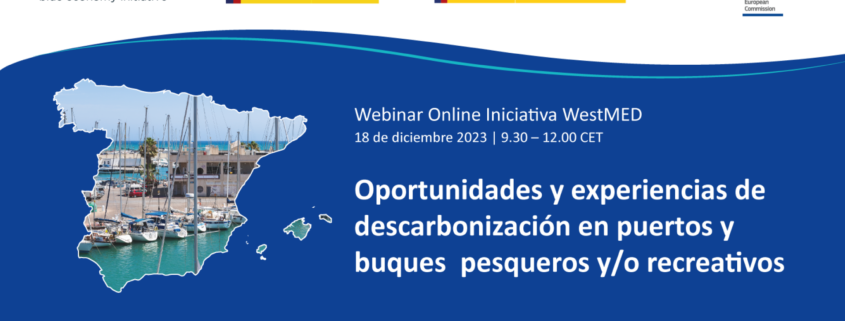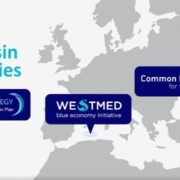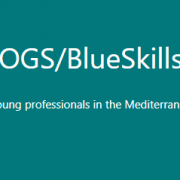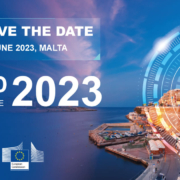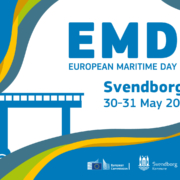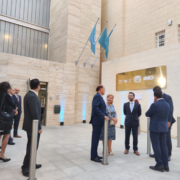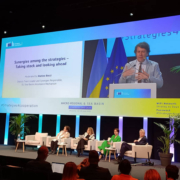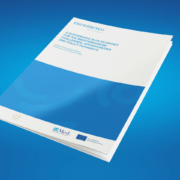Strong interest for WestMED Spain webinar on decarbonizing small ports and vessels
For Spanish, click here | Webinar recording available below or on YouTube
On December 18, 2023, WestMED’s National Hub Spain hosted a webinar titled “Opportunities and experiences for decarbonizing recreational and fishing vessels and ports”.
The meeting, organised in collaboration with the Ministry of Agriculture, Fisheries and Food and the Ministry of Foreign Affairs, European Union and Cooperation, brought together 97 participants with representatives from authorities (regional, national), companies, SMEs, NGOs, scientists, clusters, fishing associations, FLAGs and universities (list of participants).
Main objectives
The webinar supports the effort to decarbonize the fishing and recreational boating sector in the Western Mediterranean and help achieve the objectives of the European Green Deal, including the reduction of GHG emissions, while taking into consideration the profitability, sustainability and resilience of these sectors.
The main objectives of this Webinar were to:
• Raise awareness of the WestMED Initiative and its Assistance Mechanism
• Discuss opportunities and challenges of decarbonizing ports and recreational and fishing vessels
• Provide the perspective of the fishing and recreational boating industry (perspectives of ports and vessels) in the face of the decarbonization challenges
• Discuss possible energy sources, technological solutions, regulatory frameworks and general opportunities and challenges to move towards decarbonization efforts
• Share the efforts by the Ministry of Agriculture, Fisheries and Food
• Share the efforts by the General Directorate of the Merchant Navy and the Ministry of Transport and Sustainable Mobility
• Interact with the most relevant stakeholders at the national level regarding the decarbonization of ports and recreational and fishing vessels
Welcome/ Opening
Jose Maria Solano, national representative of the WestMED Initiative of the Ministry of Agriculture, Fisheries and Food, highlighted the decarbonization efforts in Spain, both on the Atlantic and Mediterranean shores, where up-to-today, there is still no viable technology of zero emissions that allows total decarbonization of the fishing and/or recreational fleet.
Objectives and context of decarbonization in the Western Mediterranean
Marta Pascual, Spanish national hub of the WestMED Initiative, explained the opportunities for European funding and collaboration through European projects with the support of the WestMED Initiative and, more specifically, under the advice of the Assistance Mechanism. Marta explained that the results and materials from the webinar would be sent to the Energy Transition Partnership (ETP) so that they could take them into account in the roadmap they are developing for 2024
(see presentation)
Spanish position regarding the decarbonization of the fishing fleet
Francisco Manuel Fernández Martínez, deputy director of the general secretariat of fisheries of the Ministry of Agriculture, Fisheries and Food, expressed the Spanish position regarding the energy transition of the fishing fleet.
(see presentation)
Fernández Martínez explained the commission’s communication on the energy transition in the fishing and aquaculture sector (February 21, 2023), highlighted the state and typology of the Spanish fishing fleet and reflected on what the 3 challenges that the fishing sector faces in order to carry out decarbonization: technological barriers, knowledge and legislative barriers, and financial barriers.
He also listed the 4 main areas of action: 1) Improvement of the governance and cooperation/coordination framework between the different actors involved; 2) Overcome existing technological and knowledge gaps through R&D; 3) Improve the business environment of the activity, including those related to financial opportunities; 4) Manpower trained and prepared in the new skills that will be necessary in the Energy Transition.
Decarbonization and sustainability of the nautical industry
Jordi Carrasco, general director of the National Association of Nautical Companies – ANEN, commented that the recreational boating sector is very heterogeneous (marinas, shipyards, auxiliary industry, rental, etc.) but that the sustainability from a global approach: Advancing engines with the reduction of their emissions, controlling pollution, promoting electric and solar-powered boats, with new construction methods that work on the decarbonization of the entire life cycle of recreational boating . Mr. Carrasco commented on the results of the Ricardo Report which was commissioned from Ricardo plc by ICOMIA – International Council of Marine Industry Associations.
This report highlights that the nautical sector represents less than 0.1% of total greenhouse gas emissions and focuses on propulsion technologies in recreational vessels less than 24 meters in length (5 propulsion and fuel storage systems). energy and 9 categories of vessels). The conclusion of the report are that there is no single solution to reduce greenhouse gas emissions in the propulsion of recreational boats and that we must focus on understanding the type of use of the boat in order to suggest different propulsion systems. It was also commented that the impact of alternative propulsion on the prices of future pleasure boats is expected to increase between 5% and 250%, depending on the technology used. This is why it is urgent to carry out an analysis of the life cycle of the sector with a comprehensive vision from design and manufacturing to the end of the useful life of the vessels.
Decarbonization in fishing vessels
Next, Miguel J. Núñez Sánchez, Transport Counselor of the Permanent Representation of Spain to the EU, presented the opportunities and experiences of decarbonization in fishing vessels (industrial fishing) taking into account the great difference that exists between merchant and fishing vessels since It is a sector to which the legislation that applies is less (MARPOL Convention). In addition to this, sustainability is sought throughout the life cycle, both in the production part (fishing and transport chain) and in the life cycle analysis of the vessels.
However, the analysis and regulation of emissions in the transport chain will not be applied to fishing vessels. Mr. Núñez also commented on the difficulties of fishing vessels in obtaining an efficiency index. This means that fishing boats must generate their own efficiency indices that measure the best energy efficiency in engines, residual heat, lower powers, uses of low-consumption lighting, better cold management, etc. (different from the FuelEU Maritime or the Count Emissions index).
(see presentation)
Presentation of projects: “Study of the implementation of electric motors in the Albufera boats” and “Construction of the Albufera pilot boat
Amparo Aleixandre Puchades, Manager of the GALP of Gandía Albufera, presented two projects: “Study of the implementation of electric motors in the Albufera boats” and “Construction of the Albufera pilot boat”.
The study consisted of an environmental, economic and energy analysis and determined and categorized the use and movements of the boats in l’Albufera to know which of these boats could go from having combustion engines to electric motors. The study led to a pilot test of a boat in l’Albufera that is currently in use.
(see presentation)
Business perspectives: Torqeedo GmbH/ CASTALIA Project
In the final part of the event, two companies were invited to give their business perspective on decarbonization and show their adaptation solutions.
Carlos Martínez, Iberia & South America Manager of Torqueedo GmbH presented their advanced electric propulsion options in water as they are pioneers and leaders in the recreational boating market. Carlos explained to us what electric propulsion is for (pure electric) and what it is not for. It is not suitable for large lengths that want to move quickly, it is suitable for short distances and 10-12m boats. If we look at the life cycle, batteries pollute and that is why we have to look at the solution, but also at their use.
Next, Mr Ramón Zubiaga from Consulmar and Samuel Gómez from the SYM NAVAL Shipyard presented their port services and the CASTALIA project, a 100% electric, zero-emission, multipurpose vessel.
(Presentation Torqeedo)
(Presentation project Castallia: SYM Blue brochure | video)
Main Conclusions
- There is no single or universal solution
- Alternative fuels are a solution with great potential to decarbonize the current recreational fleet.
- It is necessary to find the best solutions for each type of fleet to carry out the energy transition.
- The energy transition must be accompanied by the necessary funds for fleet renewal to build ships that can incorporate zero-emission technologies when they are available.
- It is necessary to review the concepts of the Common Fisheries Policy so that the regulations are not a brake on the modernization of the sector and the energy transition.
- The impact of alternative propulsion on the prices of future pleasure boats is expected to increase between 5% and 250%, depending on the technology used.
- It is urgent to carry out an analysis of the life cycle of the sector with a comprehensive vision from design and manufacturing to the end of the useful life of the vessels since the supply chain of materials and their energy consumption generates a significant amount of CO2.
- More R&D promotion is required so that technologies are competitive in autonomy, price and CO2 emissions.
- Security protocols and specific standards are required for new technologies.
- In the industrial fishing sector, there is a lack of efficiency legislation at European or IMO level.
- The IMO Greenhouse Gas Strategy does not apply to fishing vessels.
- The FITFOR55 measures do not apply to fishing vessels except in the RED III Directive on fuels.
- There is an urgent need to improve coordination and cooperation between interested parties.
- It is urgent to develop capabilities and a workforce adapted to the energy transition.
- We need to improve the business environment, including financing opportunities.
Webinar recording (in Spanish)

